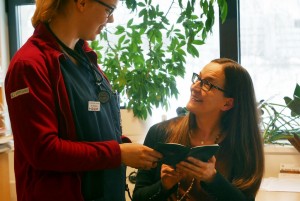Who are you, what do you do and how long have you worked at the Faculty of Veterinary Medicine?
 My name is Eeva Koskela, and I am an academic affairs secretary at the Department of Equine and Small Animal Medicine. I work at the Veterinary Teaching Hospital in Viikki, where I have worked for four and half years or so. My job description contains a bit of everything: on some days I draw up on-call lists for students working at the Hospital, on others I try to figure out where to get 20 horse shoes melted down for the farrier course.
My name is Eeva Koskela, and I am an academic affairs secretary at the Department of Equine and Small Animal Medicine. I work at the Veterinary Teaching Hospital in Viikki, where I have worked for four and half years or so. My job description contains a bit of everything: on some days I draw up on-call lists for students working at the Hospital, on others I try to figure out where to get 20 horse shoes melted down for the farrier course.
However, most of my work involves helping and advising students and cooperating with the clinical instructors and professors. With the students, I sketch personal study plans and make special arrangements to accommodate illness or other matters. Sometimes we just talk about coping with studies or about life in general. In my duties involving the teaching staff, I handle mainly course and examination arrangements, assign students to different groups and take care of other administrative tasks. The assessment of clinical skills, carried out in the spring, also takes time – and adds excitement into the students’ lives in particular. Of course I also do routine work, such as record completed courses in the Student Register and monitor studies.
I am also the security manager of Clinicum, which means I cooperate with the safety officers and the first-response team to keep the building safe for customers, patients, staff and students. Every now and then I tour the Hospital with visiting fire officers, which is a lot of fun.
What stands out as important in your work in 2015?
The transfer from a three-week to a two-week clinical rotation was a major change. More elective elements were added to the students’ clinical year, which had remained the same for years. A few other minor changes were also made to it. The introductory course to clinical equine and small animal medicine, which takes place in the spring of the third year also underwent a few minor changes. Trying to fit the students’ abattoir training, the introductory weeks at the Production Animal Hospital, and eight small-group course assignments neatly into their timetables was a real puzzle. Of course, it always takes time for things to run smoothly after reforms, but reforms and challenges are a must at work!
What is the best thing about your work?
I feel I’ve got the best job in Finland! The students and my colleagues are the salt of my work. I really enjoy being of help and at least temporarily relieving students’ stress through small actions. I get to know some of the students very well in their fourth and fifth years, so it’s nice to run into them in the Hospital hallways, exchange hellos, and be able to answer their questions.
I appreciate the diversity in my work. No two days or seasons are alike, so there’s no risk of getting bored! I also get to exercise my brain and think independently while engaging in teamwork with great people. It is also wonderful to receive thanks for simply doing your work!
What are your plans for 2016?
All the reforms, cooperation negotiations and the new service organisation will certainly make the year 2016 an exciting one. I hope to continue my work despite the changes and to do it so well that the whirlwind of reforms doesn’t disturb the students and teaching staff. I obviously hope I can continue in my job and that our close work community undergoes as few changes as possible.